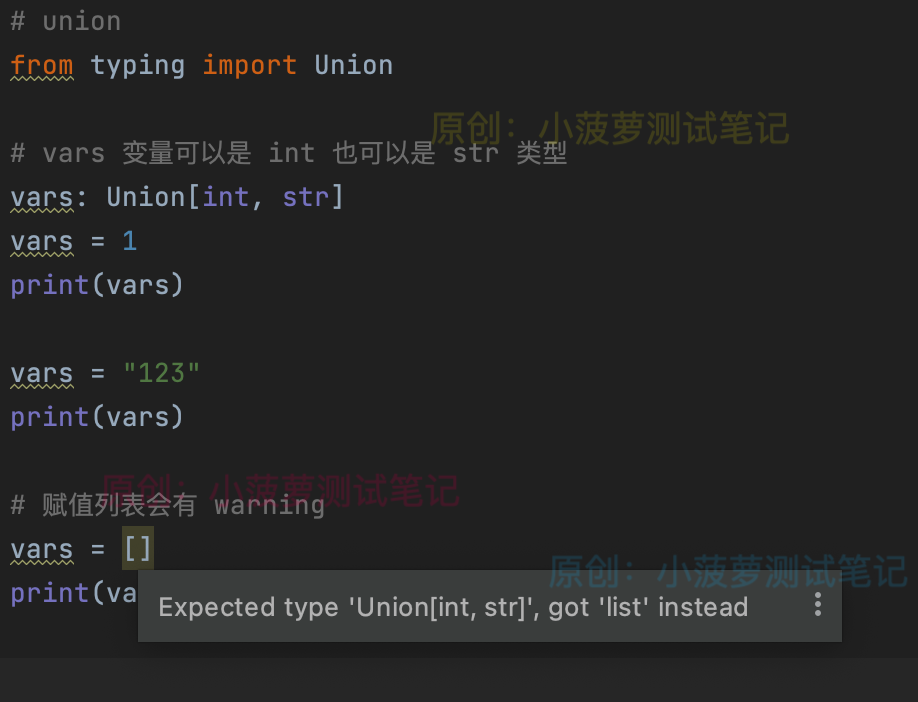Python-类型提示-类型注释符号(定义变量时指定数据类型)
typing 是在 python 3.5 才有的模块
# Python-类型提示-类型注释符号 ########################################## # 变量 ########################################## # This is how you declare the type of a variable type in Python 3.6 age: int = 1 # In Python 3.5 and earlier you can use a type comment instead # (equivalent to the previous definition) age = 1 # type: int # You don't need to initialize a variable to annotate it a: int # Ok (no value at runtime until assigned) # The latter is useful in conditional branches child: bool if age < 18: child = True else: child = False ########################################## # 内置类型 ########################################## from typing import List, Set, Dict, Tuple, Optional # For simple built-in types, just use the name of the type x: int = 1 x: float = 1.0 x: bool = True x: str = "test" x: bytes = b"test" # For collections, the name of the type is capitalized, and the # name of the type inside the collection is in brackets x: List[int] = [1] x: Set[int] = {6, 7} # Same as above, but with type comment syntax x = [1] # type: List[int] # For mappings, we need the types of both keys and values x: Dict[str, float] = {'field': 2.0} # For tuples of fixed size, we specify the types of all the elements x: Tuple[int, str, float] = (3, "yes", 7.5) # For tuples of variable size, we use one type and ellipsis x: Tuple[int, ...] = (1, 2, 3) # Use Optional[] for values that could be None x: Optional[str] = some_function() # Mypy understands a value can't be None in an if-statement if x is not None: print(x.upper()) # If a value can never be None due to some invariants, use an assert assert x is not None print(x.upper()) ########################################## # 功能 ########################################## from typing import Callable, Iterator, Union, Optional, List # This is how you annotate a function definition def stringify(num: int) -> str: return str(num) # And here's how you specify multiple arguments def plus(num1: int, num2: int) -> int: return num1 + num2 # Add default value for an argument after the type annotation def f(num1: int, my_float: float = 3.5) -> float: return num1 + my_float # This is how you annotate a callable (function) value x: Callable[[int, float], float] = f # A generator function that yields ints is secretly just a function that # returns an iterator of ints, so that's how we annotate it def g(n: int) -> Iterator[int]: i = 0 while i < n: yield i i += 1 # You can of course split a function annotation over multiple lines def send_email(address: Union[str, List[str]], sender: str, cc: Optional[List[str]], bcc: Optional[List[str]], subject='', body: Optional[List[str]] = None ) -> bool: ... # An argument can be declared positional-only by giving it a name # starting with two underscores: def quux(__x: int) -> None: pass quux(3) # Fine quux(__x=3) # Error ########################################## # 标准"duck_types" # 在典型的Python代码中,许多可以将list或dict作为参数的函数只需要它们的参数以某种方式“list-like”或“dict-like”。“list- # like”或“dict-like”(或其他类似的)的特定含义称为“duck-type”,并且标准化了惯用Python中常见的几种duck类型。 ##########################################
Callable[..., Any],可调用者接受任意数量的/类型的参数并返回任何类型的值。
pretrained_model_name_or_path: Optional[Union[str, os.PathLike]]
`str` or `os.PathLike`
前置学习
Python 类型提示:https://www.cnblogs.com/poloyy/p/15145380.html
常用类型提示
https://www.cnblogs.com/poloyy/p/15150315.html
类型别名
https://www.cnblogs.com/poloyy/p/15153883.html
NewType
https://www.cnblogs.com/poloyy/p/15153886.html
Callable
https://www.cnblogs.com/poloyy/p/15154008.html
TypeVar 泛型
https://www.cnblogs.com/poloyy/p/15154196.html
Any Type
https://www.cnblogs.com/poloyy/p/15158613.html
Union
联合类型
Union[int, str] 表示既可以是 int,也可以是 str
等价写法
vars: Union[int, str]
# 等价于
vars: [int or str]
vars: Union[int]
# 等价于
vars: int
union 等价写法
Union[int] == int
最终 Union[int] 返回的也是 int 类型
Union[int, str, int] == Union[int, str]
重复的类型参数会自动忽略掉
Union[int, str] == Union[str, int]
自动忽略类型参数顺序
Union[Union[int, str], float] == Union[int, str, float]
union 嵌套 union 会自动解包
Optional
https://www.cnblogs.com/poloyy/p/15170297.html
REF:
https://wenku.baidu.com/view/665fca1364ec102de2bd960590c69ec3d5bbdb7b.html



 浙公网安备 33010602011771号
浙公网安备 33010602011771号